IN REMEMBRANCE OF BDR TRAGEDY: Tearful adieu
Published in The Daily Star on Wednesday, February 25, 2015
Syeda Nazneen Ferdousi
 WE say life moves on and it is only wiser to look forward. But is there anyone who can deny the power of memory? In fact, what we call the present is given shape by an accumulation of the past.
WE say life moves on and it is only wiser to look forward. But is there anyone who can deny the power of memory? In fact, what we call the present is given shape by an accumulation of the past.
Even unpleasant memories are revisited – sometimes intentionally -- to reimagine if things could have been said or done differently, if we can 'undo' the past. Alas, little do we realise the harsh reality – “Time is like a river. You cannot touch the same water twice because the flow that has passed will never pass again.”
A part of us wants to forget these unpleasant memories, while another part of us wishes to preserve them. And it is with these mixed emotions that I remember my brother-in-law Shaheed Col MojibulHoque. Col Mojib was due to retire on April 3, 2009 but the BDR massacre on 25-26 February didn't let him enjoy the leisure of retirement. My wishful thinking over the past six years has been: What if he were still alive? What if he had retired earlier? What if he had fallen ill after the parade on 24 February and wasn't present there that day?
After six long years, I have finally reconciled with his death. Knowing the person he was, I am sure the prevailing situation in the country would have killed him spiritually, anyway. The erosion of values – socially and politically, rising trend of violence, unending greed for power, lack of vision for national interest and the disrespect towards the general public – would have been reasons enough to quash his zeal were he alive today.
We were close friends and shared our views on a wide range of issues. His devotion, patriotism and loyalty were just out of the world! I admired and respected him not only because he was my sister's husband but also as a human being. I remember a very small incident – my sister and I went to a supermarket for picking up groceries and other essentials. Col Mojib accompanied us. As I was about to put a foreign toothpaste in my shopping trolley, he immediately asked why I didn't use Bangladeshi ones, adding, “If we don't patronise our own industries, how will they survive”?
He lived a simple life. His family was his estate. He bought only Bangladeshi sarees for his wife and always preferred Bangladeshi products to give away as gifts. He had a vision for Bangladesh – that someday this country will shine in the world map, the youth will take the lead in shaping the political dynamics for the ultimate good and 'people' will be the biggest asset for this country.
Today, as we somberly observe the sixth anniversary of the Pilkhana massacre, I express my deepest respect to the 74 lives that were senselessly slayed in just 2 days. I am praying for the families they left behind; little do I know how their days are passing.
So, here is the tearful adieu to my ardent wishful thinking that he was still alive I sync my thought with that of Sydney Carton, just before he faced the guillotine in A Tale of Two Cities - “It is a far, far better rest that I go to than I have ever known.”
Rest in eternal peace dear Mojib.
The writer is sister-in-law of Col. Mojibul Hoque.
Published in The Daily Ittefaq on Monday, February 25, 2013
M Emamul Haque
Bangladeshis set example in Savar rescue operation
Published in The Daily Star on Sunday, May 26, 2013
Staff Correspondent
 Wife of Ezazuddin Kaikobad receives the 1st annual Bravery and Humanitarian Award of Colonel Mujib Trust on behalf of her husband in the capital's Raowa Club yesterday. Kaikobad sacrificed his life while trying to save trapped people in the rubble of the Savar Rana Plaza building, which collapsed on April 24. Photo: Star
Wife of Ezazuddin Kaikobad receives the 1st annual Bravery and Humanitarian Award of Colonel Mujib Trust on behalf of her husband in the capital's Raowa Club yesterday. Kaikobad sacrificed his life while trying to save trapped people in the rubble of the Savar Rana Plaza building, which collapsed on April 24. Photo: Star
The courage, selflessness and determination shown by Bangladeshis from all walks of life in the aftermath of the Savar tragedy will remain an example for people from all over the world, said speakers yesterday.
They also hoped that the nation can learn from the accident .
They made the observations at the 1st annual Bravery and Humanitarian Awards programme at the capital's Raowa Club. Maj Gen (rtd) Jamil D Ahsan Bir Pratik, was the chief guest at the event.
Colonel Mujib Trust gave awards to 15 individuals and five organisations in recognition of their outstanding contribution to rescue and rehabilitation work during the recent Rana Plaza collapse.
Among the recipients was Ezazuddin Kaikobad, who sacrificed his life while trying to save trapped lives in the building.
Enam Medical College and Hospital, Red Crescent Society, Government Bangla College Rover Scout Group, Anjuman Mufidul Islam and Government Titumir College Rover Scout Group also received the award.
The nine-storey Rana Plaza collapsed on April 24, killing at least 1,127 people. Rescuers pulled out 2,438 people alive from the rubble.
Published in The Daily Ittefaq on Monday, February 25, 2013
M Emamul Haque
Remembering Col. Mojibul Hoque and the brother Martyrs
Published in The Daily Star on Monday, February 25, 2013
M Emamul Haque
 Surprisingly, four years have swiftly passed since the death of your band of brothers. In these 48 months your silences ringed out loud and clear in our lives. I know that in line with the laws of existence, we will hear you speak no more. We may try but won't be able to comprehend what went through your minds that fateful day and night. Did you notice the sun shining, the birds chirping either in alarm or silent and frightened away by the gunfire and explosions of the handful of cowards methodically exterminating the brave sentinels of my beloved motherland?
Surprisingly, four years have swiftly passed since the death of your band of brothers. In these 48 months your silences ringed out loud and clear in our lives. I know that in line with the laws of existence, we will hear you speak no more. We may try but won't be able to comprehend what went through your minds that fateful day and night. Did you notice the sun shining, the birds chirping either in alarm or silent and frightened away by the gunfire and explosions of the handful of cowards methodically exterminating the brave sentinels of my beloved motherland?
It pains me to think what other thoughts raced through your worried mind. Did you long to talk to your wife and children and siblings? I wonder what you would have done had you known that one of your child was covering in sheer raw fear of dear life within walking distance from you. Would you have been able to maintain the Soldiers poise if you had known that your wife and daughter are separated; one imprisoned and the other at school?
I am sure some such thoughts must have raced through your mind. Your thoughts were obviously overshadowed by the sense of duty to help bring the situation under command.
But one thing is clear: Out of sheer raw bravery as a Soldier, you displayed purpose and commitment when you ventured out -- unarmed amidst a nest of fully-armed-to-the-teeth dastardly traitors -- at the command of your General, towards your destiny, the destiny which every true soldier dreams of -- to become a veteran or a martyr -- a Shaheed.
Today, in a far away land, displayed on my desk are your photographs -- pictures showing you in service uniform, as an ace Golfer and one capturing a moment of you as command of a sector in Georgia.
In your early years, you were a good debater, showing a glimpse of your talent as a natural speaker. There was something electric about the way you spoke, giving off a burst of energy for the audience to absorb. That vigor yet keeps me going when my spirits are low because, as the poet said "I have promises to keep and miles to go and miles to go before I sleep."
Dada, your departure was unexpected and sudden, you could have offered so much more to those you loved and to the motherland. Alas, dear Dada, it hurts to realise that we will not communicate any more the way we used to in the not so distant past.
Although you were, are my eldest brother, you never took offence but instead remained elder brotherly calm and steadfast to your philosophical views. You displayed confidence and without any ambiguity, you forcefully reiterated that when it came to integrity, there is no option but to lead decent and honourable lives.
I last saw my dear brother, Colonel Mojib's face, peaceful, devoid of life, at the mortuary of CMH. And I also remember his firm and alert face saluting the dais at the 2009 Annual BDR Parade, just a few days earlier. So much had changed within these few days and so much did not happen that ought to have, it is indeed a conundrum. That lifeless face was the face of a humble and calm self. His graying mustache camouflaged his last facial expressions when the cowards and hyenas gunned him down on February 25, 2009 .
Dear Dada, sadly, many amongst us, find enough reasons to be skeptical about the future. In your motherland people are still suffering meaningless, untimely and violent deaths. Only recently, an innocent apprentice tailor by the name of Biswajit was extremely brutally slaughtered in broad day-light in plain view of a large general citizen, over 100 innocent ready-made-garment workers lives turned into ashes, their charred bodies dumped in body-bags, buried in anonymous graves, awaiting DNA identification.
This, unfortunately, has become the way of the world in our unique brand of democracy. However, in spite of such hopelessness, I see a flicker of light at the end of tunnel, in the form of our youth. I trust, hope and pray that they shall turn their back on such heinous and putrefied political culture.
The youth are blessed by the legacy of the band of martyred officers, the lesson of patriotism. Unbeknown to the traitorous perpetrators, the youth is aware of the truth and is looking forward to its revelation and justice. Our youth have witnessed your bravery and they feel proud that this nation produced sons like you all. They appreciate the strength of your convictions.
I feel confident that they will not get caught up in the present social pettiness. They have a promise to fulfill, and they know the debt they own you all and the promise they have made to you and to the nation. We have weaved a history through such sacrifices and our youth are donned in red and green, the colours of the motherland's standard.
I reassure you, if you can feel this that they observe everything and they shall not disappoint you.
You must have seen them, their vigor and spirit in recent time at Shahbagh. This time around, they will neither quit nor will they remain quiet anymore.
Today, on Shaheed Shena Dibosh, we remember all of you with tears in our eyes and gratitude in our hearts and hope in our minds.
May you all rest in peace, Ameen.
The writer, a former UN staff, is the brother of Shaheed Colonel Mojibul Hoque.
Email: emamul.haque@gmail.com
Published in The Daily Ittefaq on Monday, February 25, 2013
M Emamul Haque

February 25: Tribute to our stellar guide
Published in The Daily Star on Saturday, February 25, 2012
M Emamul Haque
My eyes would light up the minute he walked into the room, and that was not uncommon in my household. My brother Col. Mojib had that affect on a lot of people, and many of his young colleagues told me how profoundly they admired him. He had a special way of showing care and respect, which made everyone feel that she or he was a very special and an important person. I was always amazed to observe his oratory skills and love for the country. I learnt patriotism from him.
The last time I spoke to Col. Mojib was on February 24. I called to praise his command for the beautifully orchestrated parade. I never felt such a blow in my heart when I was told that my brother Col. Mojib was killed with his other fellows. When the news broke I rushed to BDR HQs but couldn't communicate with my brother. I called many other officers who I knew but that also went in vain.
I still give way to a flood of tears when thoughts of him rush in. I lost my mother in 2007 to cancer and my father earlier in 2001 but nothing has ever hurt like losing my brother, my guide and confidante. On that black day I lost everything that was my foundation and strength. I thought I was going to lose my mind or simply die from a broken heart, but I didn't. I managed to get through all the pain. I owe this endurance to my brother too, who was an example of strength. On the black days of February 25 and 26 in 2009, despite the cruelty and harsh actions of the scoundrels, they failed to beat our brothers' self-dignity and love for the motherland.
The whole nation felt the pain and cried together. We all were so surprised by the incident and felt such a great loss that it spun our lives into other directions. With death, I believe many of us have to find something to replace that deep, dark void of heartache and loss but, this time, all the martyrs left behind the example of altruism and self-sacrifice for us to see and move on. From them we learned inspirational patriotism and a higher concept of honour and human dignity than anyone in recent time could have ever taught us.
Col. Mojib felt a deep sympathy for the section of the population who remain half-fed, and for the youth. Once, after returning from a mission to capture a notorious criminal, he found that the man's poor children were not going to school due to poverty. The very next day he called the local commissioner and handed over education materials for the children and requested the commissioner to do his best so that they remained in school. His heart ached for not being able to help them adequately.
He had an extraordinary confidence in our youth, as they were the future of the country. As time goes on my respect for him enhances manifold. He was the one person that I knew would always be there by my side, giving me strength and courage to get through life. He didn't judge, he just listened with understanding and love, and always gave his honest opinion. Having someone like this in life is a special gift and he was a gift to many.
It's hard to believe that it's been almost 3 years now. I had a chance to speak to the martyrs' loved ones; their wives, children, parents, brothers, sisters and friends. They all said the same things: "Our lives were changed forever on the day we lost our best sons of the soil." We will never forget what they meant to all of us but, deep down, we feel that we were lucky because we had been blessed to have such wonderful persons around us.
My brother even today is constantly giving me strength to live a life for the country. The vigour I require to live far away from my motherland also comes from him. Someday soon, I will return where my brother is sleeping in peace with all his colleagues. Col. Mojib is responsible for making me the person I am today, and with that part of him still in me, I will never truly be alone. I knew that he would always be there for me no matter what. Its now my turn to prove whether I really have learnt anything from the life he lived.
Our brothers, martyred military officers, had proven time and time again that their courage and their characters were strong enough to withstand any challenge that came their way. Their strength and perseverance are an inspiration to everyone who knew them. In dedicated service to our motherland they sacrificed their lives. To show respect to our fallen heroes we will make sure the culprits are brought to justice. We will march forward the way our heroes refused to give up. You all are in our hearts dear brothers; Col. Mojib Trust along with many others will remember you all today with special events. Far away from your motherland, in Canada, your friends and colleagues will hold special programmes to show their respect to all of you.
Our youths are blessed by what our martyred officers have left for them, the lesson of patriotism. I hope they (our youth) will always live their lives with the realisation that it is not only about them and what they may be able to do, but what they can do for the country.
We all, including our government and civil society, assured the nation that our fallen heroes will not be forgotten and we as a nation will keep getting inspiration from their life and works. It is time now to ask ourselves, what have we done so far to remember them? How are we showing respect to them? We often get so caught up in ourselves that we fail to see anyone else but ourselves. Let's not forget, we have a promise to fulfill, and we all know what promise we made to our fallen heroes.
Today, on Shaheed Shena Dibosh, let us send our gratitude, respect and remembrance to the fallen heroes.
Dear brothers, you are for us the bright stars that show the way to travelers when the sky is dark and the ways unsure, and we will come back to you for strength and direction. Today, on February 25, with this piece we remember all the martyrs with tears in our eyes and gratitude in our hearts.
The writer is brother of Shaheed Colonel Mojibul Hoque.
Email: emam85@hotmail.com
An open letter to Shaheed Colonel Mojib
Published in New Age on Friday, 25 February 2011
M Emamul Haque
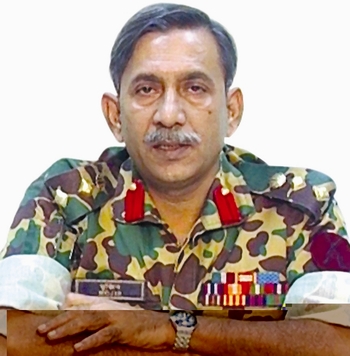
The late colonel Mojibul Hoque
Dear Colonel Mojib,
Family and friends have gathered today to honour your memories, your courage and your selfless service to your country. As we think about all the joy that you brought into our lives, we are always able to smile and to laugh through the tears and the pain.
One thing we all know is that you are somewhere safe and at peace with your beloved colleagues who embraced martyrdom for the motherland on February 25 and 26, 2009. We indeed feel proud of the sacrifice and courage of all your comrades, 57 bright army officers, one jawan and a BDR official, but sadly you all had to prove your worth to the nation at the cost of your supreme sacrifice. The nation will always miss you and at the same time, this will haunt us forever.
We are proud of you for the way you all upheld your morals. I hope your morals would be reverberated in the heart of our youth.
Dear Colonel Mojib (my dear Dada), though I have never told you but perhaps you know that I always take pride in introducing myself to others as your younger brother. You were a great role model to me and still are. You had such a strong personality and always led by example everywhere you went. I often hear good things about you from people who do not know that we are brothers. You were a man of quality with the characteristics of a good soldier.
Amma use to share a traditional wisdom with us—that the back plough always follows the front plough. I hope this will be true in our life. We, your surviving three siblings, are trying to follow you and hold the patriotism in our hearts. It’s not only us; your colleagues also know how you gave your heart to being a soldier to this country. Many of our relatives say you have set an example for your siblings and I feel that you are still doing the same.
Dear Dada, you had a way of doing things that would brighten up anyone’s day. I often try to imitate your voice and call myself especially when I am alone just to get some energy from your voice. Do you know that your photo which I have at the entrance of my house gives me immense strength to look forward and face all difficulties and challenges of life? This is the photo of your last command, raising your sword up above the sky, to tell us all how much love you had for your country.
Your colleagues say you were a great soldier and commander. Whoever you worked with, you won the hearts and minds of your superiors, colleagues and those under your commands. The photo album discovered from your burnt-down house after your painful death contains remarks by your UN mission colleagues from different countries, sheds a beautiful light on your character and personality as well as the quality of your leadership. Major Hamdi Jafar of Jordan, who served under your command writes about you: ‘…not just a man of arms but also a man of tolerance, understanding heart, intellect and one who can pick up officers from all sorts of emotional ditches, one who makes big problems look so small and easy to solve, change the atmosphere of isolation into one family and home... a brother figure as well as an achieving commander.’
James T Armstrong of the Royal Air Force of UK says: ‘It has been my pleasure to work with Col. Mojib in the pursuit of peace in Georgia/Abkhazia. He has created a “Paradise” under his leadership in Gali. He has helped foster good relationships between the military observers from many different nations and diverse cultures and moulded them into a strong team that is loyal to Gali sector and the United Nations observer mission in Georgia.’
You were such a gem of a person among your friends – they wrote in your memory, ‘Mojib had an extraordinary character, who knew the song in friend’s hearts and sang that to them when their memory failed. Mojib was a true friend, who always assisted us readily, took everything patiently, defended heroically, and continued friendship unchangeably.’
I had no idea that in your life time you have met so many people and touched so many hearts. You will always be remembered by everyone who had the pleasure of being around you. I have not forgotten how you felt about our youth; you had immense faith in the young generation of this country. You had a strong feeling that the young could do miracles for this country. We have a specific plan to work with the youth and will soon launch a scheme to encourage youths of the country to uphold the patriotism.
I am sure you would be happy to know that our leading painters of the country banded together last Friday for paying tribute to all of you who embraced martyrdom for the country. All their art work will be on display for 7 days at the Dhaka Art Centre from today (February 25, 2011). Our artists felt shame as human being watching the brutality unleashed by the murderers when they mutilated the martyred bodies. They have expressed their deep respect for all of you.
Just know your families are proud; the nation is proud; just know the army is proud.
I know our government will respect the demand of the people and announce the day (February 25) as ‘Shaheed Sena Dibash’. The general mass joins all your friends and colleagues to demand for a monument, acknowledging all of your supreme sacrifice. I hope the monument will be built in a suitable public place which will keep energising our youths and inspire patriotism. We have so much to learn from you all, our martyred brothers.
Dear Dada, you will be missed along with all your martyred comrades, but you will never be forgotten. We will do all that is possible for us through the ‘Colonel Mojib Trust’, the foundation that we have set up after your name.
We are proud of you our martyred brothers.
Email: emam85@hotmail.com
Remembering martyrs of Peelkhana: An open letter to Shaheed Col Mojib
Published on The Financial Express on Friday, 25 February 2011
M Emamul Haque
Dear Colonel Mojib,
Family and friends have gathered today to honour your memories, your courage and your selfless service to your country. As we think about all the joy that you brought into our lives, we are always able to smile and to laugh through the tears and the pain.
One thing we all know is that you are somewhere safe and at peace with your beloved colleagues who embraced martyrdom for the motherland on February 25 and 26, 2009. We indeed feel proud about the sacrifice and courage of all your comrades, 57 bright army officers, one jawan and a BDR official, but sadly you all had to prove your worth to the nation at the cost of your supreme sacrifice. The nation will always miss you and at the same time, this will haunt us forever.
We are proud of you for the way you all upheld your morals. I hope your morals would be reverberated in the heart of our youth.
Dear Col. Mojib (my dear Dada), though I have never told you, but perhaps you know that I always take pride in introducing myself to others as your younger brother. You were a great role model to me and still are. You had such a strong personality and always led by example everywhere you went. I often hear good things about you from people who do not know that we are brothers. You were a man of quality with the characteristics of a Good Soldier.
Amma mother used to share a traditional wisdom with us, which says that the back plough always follows the front plough. I hope this will be true in our life. We, your surviving three siblings, are trying to follow you and hold the patriotism in our hearts. It's not only us; your colleagues also know how you gave your heart to being a soldier to this country. Many of our relatives say you have set an example for your siblings and I feel that you are still doing the same.
Dear Dada, you had a way of doing things that would brighten up anyone's day. I often try to imitate your voice and call myself especially when I am alone just to get some energy from your voice. Do you know that your photograph which I have at the entrance of my house gives me immense strength to look forward and face all difficulties and challenges of life? This is the photo of your last command, raising your sword up towards the sky to tell us all how much love you had for your country.
Your colleagues say that you were a great soldier and a commander. Whoever you worked with, you won the hearts and minds of your superiors, colleagues and those under your command. The photo album discovered from your burnt down house after your painful death, contains remarks by your UN mission colleagues from different countries, sheds a beautiful light on your character and personality as well as the quality of your leadership. Major Hamdi Jafar of Jordan, who served under your command writes about you "…not just a man of arms, but also a man of tolerance, understanding heart, intellect and one who can pick up officers from all sorts of emotional ditches, one who makes big problems look so small and easy to solve, change the atmosphere of isolation into one family and home... a brother figure as well as an achieving commander."
James T Armstrong of the Royal Air Force of UK says, "It has been my pleasure to work with Col. Mojib in the pursuit of peace in Georgia/Abkhazia. He has created a 'Paradise' under his leadership in Gali. He has helped foster good relationships between the military observers from many different nations and diverse cultures and moulded them into a strong team that is loyal to Gali sector and the United Nation's observer Mission in Georgia."
You were such a gem of a person among your friends - they wrote in your memory, "Mojib had an extra-ordinary character, who knew the song in friend's hearts and sang that to them when their memory failed. Mojib was a true friend, who always assisted us readily, took everything patiently, defended heroically, and continued friendship unchangeably."
I had no idea that in your life time you have met so many people and touched so many hearts. You will always be remembered by everyone who had the pleasure of being around you. I have not forgotten how you felt about our youth; you had immense faith in the young generation of this country. You had a strong feeling that the young could do miracles for this country. We have a specific plan to work with the youth and will soon launch a scheme to encourage youths of the country to uphold patriotism.
I am sure you would be happy to know that our leading painters of the country banded together last Friday for paying tributes to all of you who embraced martyrdom for the country. All their art work will be on display for seven days at the Dhaka Art Center from today (February 25, 2011). Our artists felt shame as human being watching the brutality unleashed by the murderers when they mutilated the martyred bodies. They have expressed their deep respect for all of you.
Just know your family members are proud; the nation is proud; just know the Army is proud.
I know our government will respect the demand of the people and announce the day (February 25) as 'Shaheed Sena Dibosh.' The general mass joins all your friends and colleagues to demand for a monument, acknowledging all of your supreme sacrifices. I hope the monument will be built at a suitable public place which will keep energising our youths and inspire patriotism. We have so much to learn from you all, our martyred brothers.
Dear Dada, you will be missed along with all your martyred comrades, but you will never be forgotten. We will do all that is possible for us through Colonel Mojib Trust, the foundation that we have set up in your name.
We are proud of you, our martyred brothers.
Remembering Peelkhana martyrs
Published on The Daily Star on Friday, 25 February 2011
M Emamul Haque
Dear Colonel Mojib,
Family and friends have gathered today to honour your memories, your courage and your selfless service to your country. As we think about all the joy that you brought into our lives, we are always able to smile and laugh through the tears and the pain.
One thing we all know is that you are somewhere safe and at peace with your beloved colleagues who embraced martyrdom for the motherland on February 25 and 26, 2009. We indeed feel proud about the sacrifice and courage of all your comrades, 57 bright army officers, one jawan and a BDR official, but sadly you all had to prove your worth to the nation with your supreme sacrifice. The nation will always miss you, and at the same time this will haunt us forever.
We are proud of you for the way you all upheld your morals. I hope your morals will reverberate in the hearts of our youth.
Dear Col. Mojib (my dear Dada), though I have never told you, perhaps you know that I always take pride in introducing myself to others as your younger brother. You were a great role model to me and still are. You had such a strong personality, and always led by example everywhere you went. I often hear good things about you from people who do not know that we are brothers. You were a man of quality with the characteristics of a Good Soldier.
Amma used to share traditional wisdom with us, which says that the back plough always follows the front plough. I hope this will be true in our life. We, your surviving three siblings, are trying to follow you and hold the patriotism in our hearts. It's not only us; your colleagues also know how you gave your heart to being a soldier for this country. Many of our relatives say you had set an example for your siblings and I feel that you are still doing the same.
Dear Dada, you had a way of doing things that would brighten up anyone's day. I often try to imitate your voice and call myself especially when I am alone just to get some energy from your voice. Do you know that your photo which I have at the entrance of my house gives me immense strength to look forward and face all difficulties and challenges of life? This is the photo of your last command, raising your sword up to the sky to tell us all how much love you had for your country.
Your colleagues say that you were a great soldier and a commander. You won the hearts and minds of your superiors, colleagues and those under your command. The photo album discovered in your burnt down house after your painful death, which contains remarks by your UN mission colleagues from different countries, sheds a beautiful light on your character and personality as well as the quality of your leadership.
Major Hamdi Jafar of Jordan, who served under your command writes about you "…not just a man of arms but also a man of tolerance, understanding heart, intellect and one who can pick up officers from all sorts of emotional ditches, one who makes big problems look so small and easy to solve, change the atmosphere of isolation into one family and home... a brother figure as well as an achieving commander."
James T. Armstrong of the Royal Air Force of UK says: "It has been my pleasure to work with Col. Mojib in the pursuit of peace in Georgia/Abkhazia. He has created a 'Paradise' under his leadership in Gali. He has helped foster good relationships between the military observers from many different nations and diverse cultures and moulded them into a strong team that is loyal to Gali sector and the United Nation's Observer Mission in Georgia."
You were such a gem of a person among your friends -- they wrote in your memory: "Mojib had an extraordinary character, who knew the song in friends' hearts and sang that to them when their memory failed. Mojib was a true friend, who always assisted us readily, took everything patiently, defended heroically, and continued friendship unchangeably."
I had no idea that you had met so many people and touched so many hearts. You will always be remembered by everyone who had the pleasure of being around you. I have not forgotten how you felt about our youth; you had immense faith in the young generation of this country. You had a strong feeling that the young could do miracles for this country. We have a specific plan to work with the youth and will soon launch a scheme to encourage them to uphold the patriotism.
I am sure you will be happy to know that our leading painters of the country banded together last Friday for paying tribute to all of you who embraced martyrdom for the country. All their art work will be on display for 7 days at the Dhaka Art Center from today (February 25). Our artists felt shame as human beings watching the brutality unleashed by the murderers when they mutilated the martyred bodies. They have expressed their deep respect for all of you.
Just know your families are proud; the nation is proud; just know the army is proud.
I know our government will respect the demand of the people and announce the day (February 25) as "Shaheed Sena Dibosh." The general mass joins all your friends and colleagues to demand for a monument, acknowledging all of your supreme sacrifice. I hope the monument will be built in a suitable public place, and will energise our youth and inspire patriotism. We have so much to learn from you all, our martyred brothers.
Dear Dada, you will be missed along with all your martyred comrades, but you will never be forgotten. We will do all that is possible for us through the "Colonel Mojib Trust," the foundation that we have set up in your name, which will keep strengthening us.
We are proud of you our martyred brothers.
Email: emam85@hotmail.com
Of widows, tears and murdered soldiers
Syed Badrul Ahsan
Published on The Daily Star website on 25th November 2009
THERE are the many spells of sadness we have gone through in this country. There have been the sepulchral silences we have enveloped ourselves in. There are the tears we have shed for those we have lost, through the laws of mortality or the predatory instincts of men. But nothing, absolutely nothing, compares with the vacuity you spot in the eyes of the widows and children of the military officers murdered in such insanity at Peelkhana earlier this year. A silence, one you cannot quite put into words, has come over Nehreen Ferdousi. She is not the Nehreen you knew only months ago, regaling people with her conversation, making her way to places where she knew people would sing good songs. And, yes, she and her husband, Colonel Mojibul Haq, always made sure that at the end of the day the soul would give of itself to melody, to poetry.
Suddenly, Nehreen is the symbol of huge sadness. And she is more. Through her, through her quivering lips -- and they quiver as they whisper a "thank you" to you for being there -- you understand once again the futility of existence. There is nothing you can say to her. Her loneliness is vast. It is so thick you could slice through it with a knife and yet not be able to plumb the depths of it. She loved, and loves, her husband. And these days she strives to keep his memory, his legacy and that of his murdered colleagues as it were, alive through the Colonel Mujib Trust. It is a cause she has dedicated herself to. And she has brought with her, indeed has caused to gather around her all those young women, for they are all young and all alone, who have not forgotten the good men their husbands were, who have not forgotten the beastly in all those other men who felt no shame, no sense of sin, as they went hunting those good men to kill on a February day.
And all these women and their children came together on a droopy evening this week to remember their husbands and their fathers. Some of these children, babies really, will not know their fathers -- for their fathers saw their lives end even as they found theirs taking form in their mothers' wombs. There were the other children. In their eyes, there was a strange gleam that comes of a recalling of tragedy.
If you have read of the deaths of the Greek heroes of old and of the pains of the women and families they left behind, you will have a fairly rough idea of the desolation that cast a thick shadow on everyone that evening. The young son of a murdered officer put it all in perspective. It did not really matter, he said in that tone of voice which hovers between anger and grief, if his father's killers were or were not brought to justice. All that he knew, that other children like him knew, was that all the fathers were gone, all the joy of life was gone and there was certainly nothing to look forward to any more. All fathers are the best of friends to their children. It was a truth reinforced once more by that young man. He looked into nowhere in particular. Or maybe he went reconstructing his father's image as he had known it. In the death of his father, he had lost his best friend. Not one eye was in the room that did not fill to the brim with tears.
A sense of the eerie pervaded the room. The dead men were there, in all their martial spirit and in all the agony of sudden, swift death. You could feel it in your bones. You could recreate their images, the contours of their smiles, the sounds of their laughter, the elegy in their dying eyes, as you looked around and glanced at the women they loved in life. These were women whose tears flooded our rooms, our homes, in February as we heard their hearts crack because their husbands' hearts had been forced to a stop by the murderers.
And then there were the mothers too, a couple of them. Enshad Ibne Amin's mother, in the fullness of dignity, was unwilling to be pitied. She is a writer, a poet. On that darkening evening, that reputation did not matter to her. But that she was a martyr's mother, that indeed she spoke for the mothers of all the other martyrs, did. And in the voice of the brother of a martyr, the brother who enlightened that sad gathering on the principles and purposes of the Colonel Mojib Trust, was a raw wound that nevertheless was reflective of pride in the heroism of the dead.
At a point after the fall of twilight, those mothers and widows and children went back home, sadder than ever. You saw, in the gathering ghostly dark, a world destroyed. You said goodbye to Nehreen. Again those lips quivered, to say "thank you." She was holding back tears.
Syed Badrul Ahsan is Editor, Current Affairs, The Daily Star. Email:bahsantareq@yahoo.co.uk
Bloody terror of Bangladesh mutiny
Mark Dummett, BBC
Published on BBC website on 27th August 2009
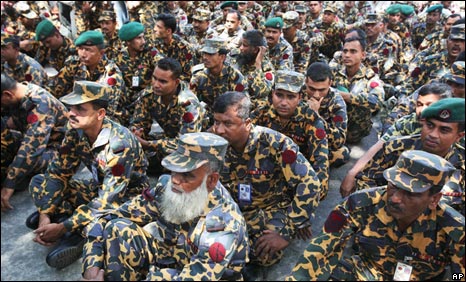
The mutineers blamed their revolt on bad pay
It was nine in the morning and, like teenagers everywhere, Nadeet was on his way to bed.
His sister was already at school, his father had said goodbye and gone to work, and his mother had just left for the gym.
Nadeet was tired after a night spent chatting to friends and tinkering with the old car he had recently bought with his father, the first the family had ever owned.
But he did not get much sleep that day.
Nadeet lived in Pilkhana, the British-era military camp in the heart of the Bangladeshi capital, Dhaka.
Its rose gardens, deer enclosure and sports fields are a world away from the mayhem of the overcrowded streets outside.
On that morning in February, soldiers of the Bangladesh Rifles (BDR) border security force were about to turn it into a killing zone.
By the time their revolt collapsed the following day, 74 people had lost their lives, and Bangladesh had been dragged to the brink of a nationwide armed conflict, as the mutiny spread to camps elsewhere.
'So ferocious'
The first Nadeet heard that something was wrong was when he was woken up by the family's housekeeper.
"Then all of a sudden there were more than 25 people firing at my house," Nadeet remembered.
"I could see the ceiling was falling off. I didn't know what to do, so I called up my friend, and I told him, listen bro' this could be the last time I'm talking to you, they're killing everyone in the BDR. So you must let the army know, and please be fast.

Nadeet (far right) hid under the bed until it was safe to come out
|
"Then I saw them break into my house. They were so ferocious. They were like, where are they, where are the kids, where are the wives?" Nadeet told the BBC World Service's Assignment programme.
He was one of the many eyewitnesses who helped us piece together what happened during the course of the mutiny.
He described his escape and how he hid under a bed until it was finally safe to come out.
Only then did Nadeet discover what had happened to his father, Colonel Mojibul Haque, a senior officer.
He was shot and then thrown out of a second-floor window by his men, after he tried to restore order.
Fifty-six other officers were also gunned down or stabbed to death, as were the wife and two civilian house guests of the BDR's commander, Major-General Shakil Ahmed, as hundreds of soldiers went on the rampage.
The mutilated bodies were then dumped in mass graves, sewers and the camp's incinerator.
"Every day I ask myself why did such a brutal thing take place," Nadeet's mother Nehreen, who survived by hiding in the gym, said.
Perplexing questions
"My husband and the officers used to work so hard for these soldiers' benefit. My husband was a true soldier. He was such a loving and joyful character."
The question of what led to such brutality is one that has perplexed Bangladeshis ever since.
When the mutineers themselves telephoned the BBC's Bengali Service, they blamed their revolt on bad pay and years of mistreatment by corrupt officers.
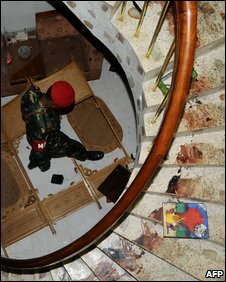
The ferocity of the mutiny took many Bangladeshis by surprise
|
They eventually gave up after the government threatened to send tanks into Pilkhana, while also promising to look into their complaints.
But Bangladesh has a history of murky political conspiracies, so many people assumed that this too must have been part of a wider plot.
Faruq Khan, the minister in-charge of co-ordinating the investigation into the mutiny, told me he thought that a hard-core group of about 20 soldiers had exploited the grievances of the other men to destabilise the government, which had been elected only two months earlier.
It is a particularly understandable view given the family history of the new Prime Minister Sheikh Hasina.
Thirty five years ago the army murdered her father, the country's first prime minister, along with most of his family, and Hasina has survived three assassination attempts since.
"I think this was planned," Faruk Khan said. "If you look at how large the matter was, that is proof that there was a planning."
The government straight away promised to uncover what was behind the revolt and administer justice as speedily as possible.
Torture charges
Six months later, the police are still working on their largest ever criminal case. There are about 5,000 suspects, and the FBI and Scotland Yard have lent a hand.
But their investigation has been overshadowed by claims that the unit conducting interrogations is torturing suspects, and may even have killed some of them.
The BDR itself admits that 40 of its men have died since February, but says seven committed suicide while the rest had heart attacks or died of other illnesses.
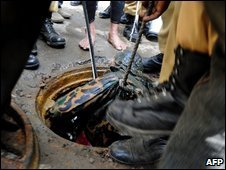
Searchers pulled bodies out of sewers around the barracks
|
Nur Khan Liton, of the Dhaka-based rights organisation Ain O Salish Kendra, said he had seen torture marks on the corpse of one BDR soldier, Mubarak, who according to official records, took his own life.
"I don't believe it, because I saw one dead body. I saw that a toenail of that BDR member had been pulled out," he said.
His claims echo those of the wife of another BDR soldier, who spoke to the BBC on condition of anonymity, because she had received phone calls threatening her with arrest if she spoke out publicly.
She described seeing her husband for the first time after his detention.
"I saw my husband seated on the floor. He could barely move because his whole body was bruised, and so were his eyes. At first I didn't recognise he was my husband.
"Then he shuffled nearer to me. He was crying. I was crying. I said 'where've you been'? He said, 'Don't ask me that. I'm alive. You've prayed for me. That's why I'm alive. But don't ask me where I've been'."
The police and the army deny the claims that prisoners are being abused, and the state prosecutor insisted that confessions had not been extracted by force.
"Torturing is not done in Bangladeshi prisons," Faruk Khan said. "The interrogators in this incident have been clearly instructed by the government that they must not go beyond the law."
Rights groups are also worried that the prisoners may not receive a fair trial.
Lawyers of some of the men say that they have been prevented from meeting their clients, in breach of the Bangladesh constitution.
The Supreme Court is currently debating whether or not the border guards should be tried under military law.
The fear is that the army's desire to punish the mutineers will outweigh all other considerations.
This may make it less, rather than more, likely that the full story of what happened ever emerges.


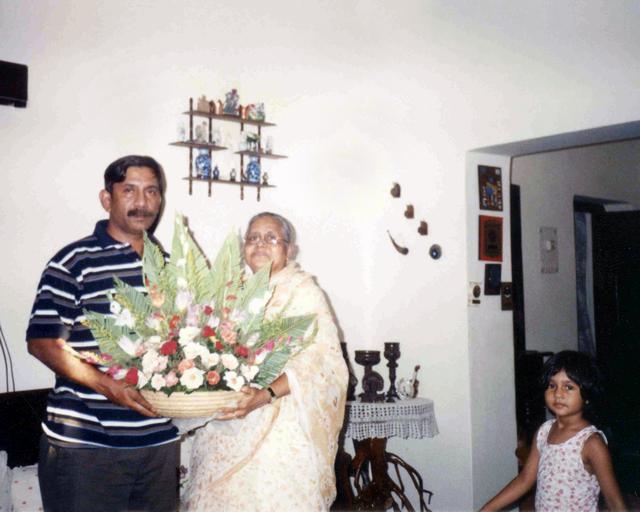
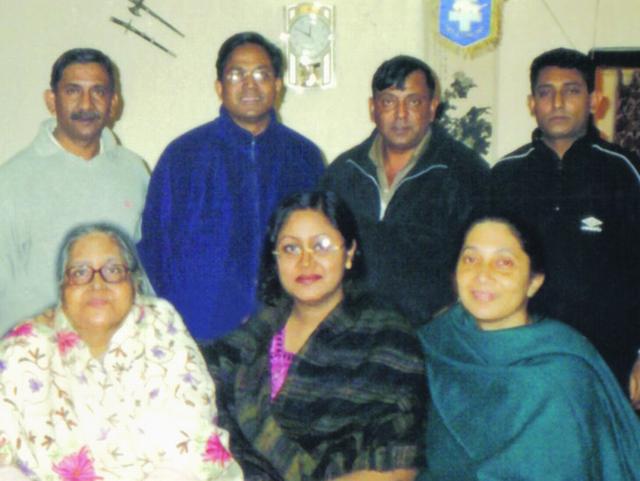
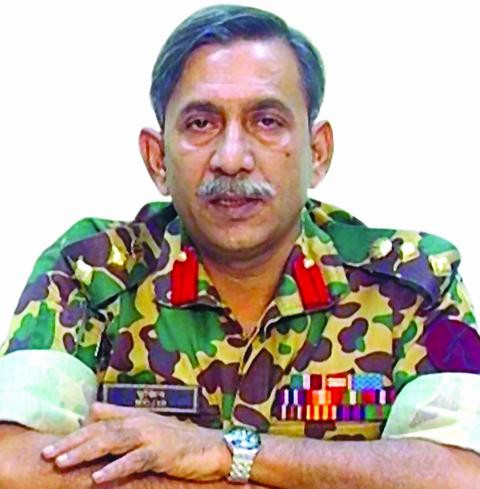
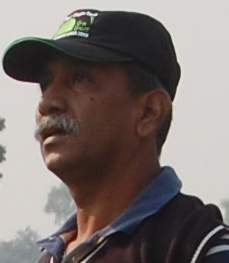
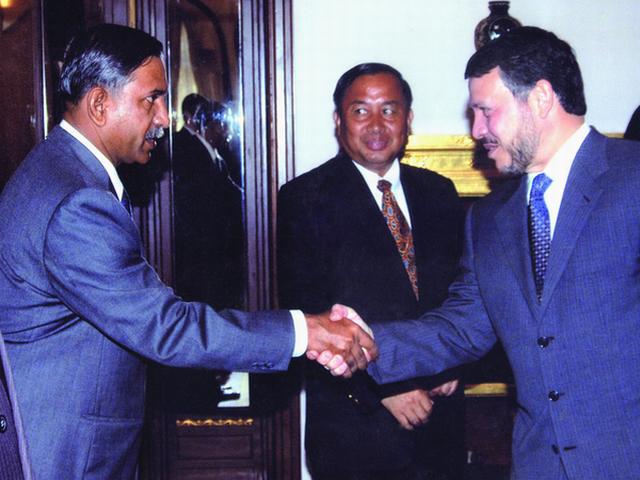
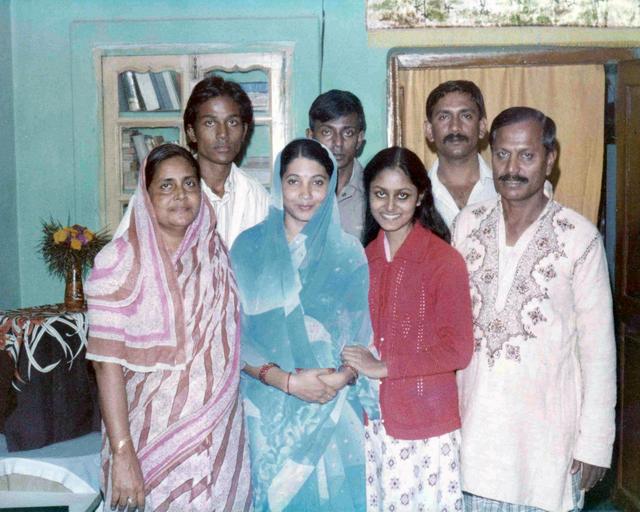
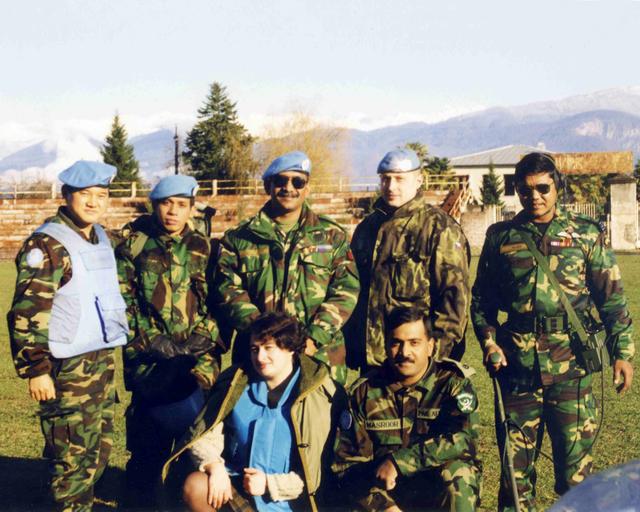
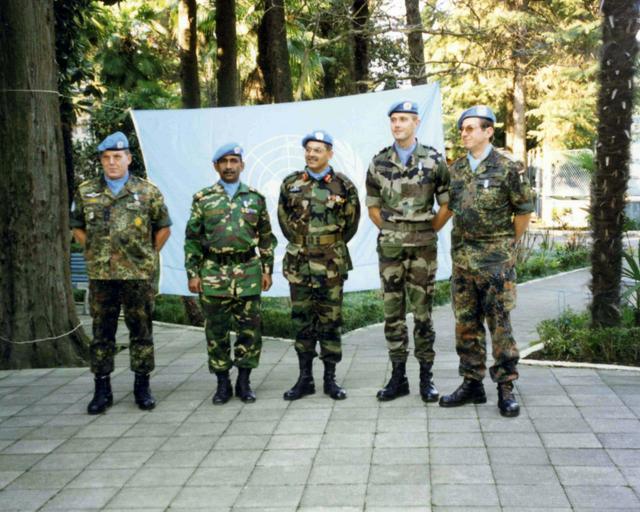
 WE say life moves on and it is only wiser to look forward. But is there anyone who can deny the power of memory? In fact, what we call the present is given shape by an accumulation of the past.
WE say life moves on and it is only wiser to look forward. But is there anyone who can deny the power of memory? In fact, what we call the present is given shape by an accumulation of the past.  Wife of Ezazuddin Kaikobad receives the 1st annual Bravery and Humanitarian Award of Colonel Mujib Trust on behalf of her husband in the capital's Raowa Club yesterday. Kaikobad sacrificed his life while trying to save trapped people in the rubble of the Savar Rana Plaza building, which collapsed on April 24. Photo: Star
Wife of Ezazuddin Kaikobad receives the 1st annual Bravery and Humanitarian Award of Colonel Mujib Trust on behalf of her husband in the capital's Raowa Club yesterday. Kaikobad sacrificed his life while trying to save trapped people in the rubble of the Savar Rana Plaza building, which collapsed on April 24. Photo: Star  Surprisingly, four years have swiftly passed since the death of your band of brothers. In these 48 months your silences ringed out loud and clear in our lives. I know that in line with the laws of existence, we will hear you speak no more. We may try but won't be able to comprehend what went through your minds that fateful day and night. Did you notice the sun shining, the birds chirping either in alarm or silent and frightened away by the gunfire and explosions of the handful of cowards methodically exterminating the brave sentinels of my beloved motherland?
Surprisingly, four years have swiftly passed since the death of your band of brothers. In these 48 months your silences ringed out loud and clear in our lives. I know that in line with the laws of existence, we will hear you speak no more. We may try but won't be able to comprehend what went through your minds that fateful day and night. Did you notice the sun shining, the birds chirping either in alarm or silent and frightened away by the gunfire and explosions of the handful of cowards methodically exterminating the brave sentinels of my beloved motherland? 




